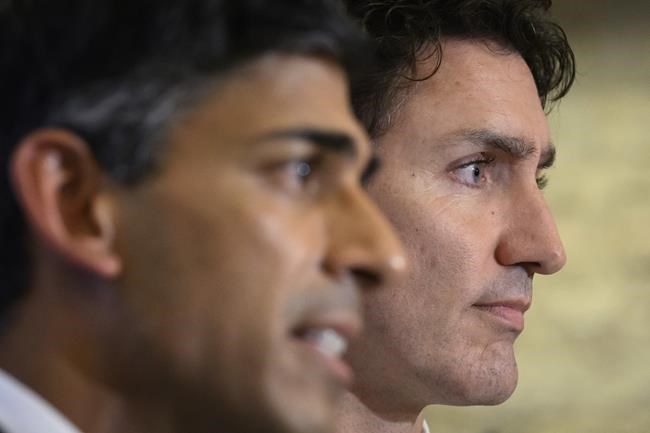OTTAWA — The association representing Canada’s multibillion-dollar defence sector is the latest to sound the alarm over this country’s unexplained absence from a security pact between some of its closest allies: Australia, Britain and the United States.
The warning from the head of the Canadian Association of Defence and Security Industries, known as CADSI, follows similar concerns from a senior Canadian military officer about the potential ramifications of Canada’s exclusion from the trilateral treaty known as AUKUS.
Those include access to — and collaboration on — cutting-edge technology such as artificial intelligence, quantum computing, and machine learning, all of which will be critical to militaries and defence in the foreseeable future.
The Liberal government has repeatedly refused to explain why Canada is not part of AUKUS, and instead downplayed its importance.
On Tuesday, Prime Minister Justin Trudeau pointed to Canada’s other security arrangements with Australia, Britain and the U.S., including the Five Eyes intelligence-sharing partnership that includes New Zealand.
He also described AUKUS as a “nuclear-submarine deal."
“We're always looking to do more and deeper with our partners either in the Pacific or elsewhere around the world," he said. "But Canada won't be buying nuclear submarines any time soon.”
Vice-Admiral Bob Auchterlonie, the commander of the Canadian Joint Operations Command, said in a recent interview with The Canadian Press that nuclear submarines are only one part of AUKUS, and he is more concerned about its focus on other state-of-the-art technologies.
CADSI president Christyn Cianfarani has also previously criticized the prime minister for describing AUKUS as a “nuclear-submarine deal."
She told The Canadian Press in an interview Tuesday that the Five Eyes partnership and other arrangements do not deal with the same issues.
“If we could see that there were great things coming out of these other strategic alliances that are in place ... then I would certainly feel a lot more comfortable that we aren’t a part of AUKUS,” she said. “But we’re not seeing that.”
Cianfarani said Canada needs to "be at that innovation table."
“It’s not just that we’ll be left behind. It’s that we can’t do it alone," she said. "If we aren’t strategic about how we’re doing it, and positioning ourselves to take advantage of that, then we will be left behind by default.”
Cianfarani is also concerned AUKUS will hurt Canada’s defence industry, which accounted for about $9.2 billion of the country’s GDP and supported 78,000 jobs, by making it easier for Australian and British competitors to sell to the U.S.
Half of Canada's defence industry exports go to the U.S. so she said losing that special market access or seeing it eroded by other nations is concerning.
The worries are especially acute given that Australia and Britain were added in 2017 to what is known as the U.S. National Technology and Industrial Base, after Canada was the only foreign member since 1993.
The NTIB effectively treats Canadian, British and Australian companies the as American competitors when it comes to military acquisitions, while also working to co-ordinate and integrate defence industry efforts across all four companies.
Canada lost its unique access to the U.S. market with the admission of Australia and Britain, but Cianfarani said the NTIB has also become “somewhat defunct” with the advent of AUKUS — which makes it all the more troubling that Canada isn’t involved.
“Like I said: if we saw that these things were delivering across the board, this strategic approach, and we were advancing in this direction,” she said, “I think all of us collectively would be a little less worried about AUKUS.”
Some analysts have previously questioned whether Canada's absence is an indication of impatience over Ottawa's perceived failure to get tough with China.
The government has in recent months hardened its position on China in a variety of ways, including through a ban on Huawei technology in Canada's 5G network, new restrictions on foreign ownership in critical minerals and the unveiling of an Indo-Pacific strategy.
That strategy is intended to signal a marked shift in federal policy and priorities toward the region given its growing importance to Canada's economy and security. It specifically identified China as "an increasingly disruptive global power."
Many of those actions, such as the Huawei ban, came only after frustration from allies over long delays. Some critics have also said the Trudeau government still isn't taking a hard enough line with Beijing.
Cianfarani did not have an answer for why Canada is not part of AUKUS, but said its exclusion is a real concern.
“A group of our bodies decided to move off campus and they didn't tell us or potentially didn't tell us they were moving to a new place,” she said. “Or we took a pass on it. Truly, we don't know.”
This report by The Canadian Press was first published Jan. 17, 2023.
Lee Berthiaume, The Canadian Press




